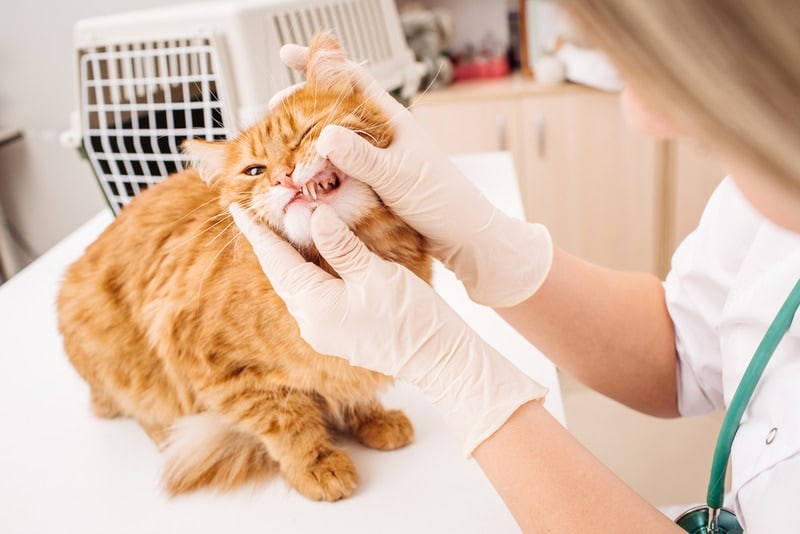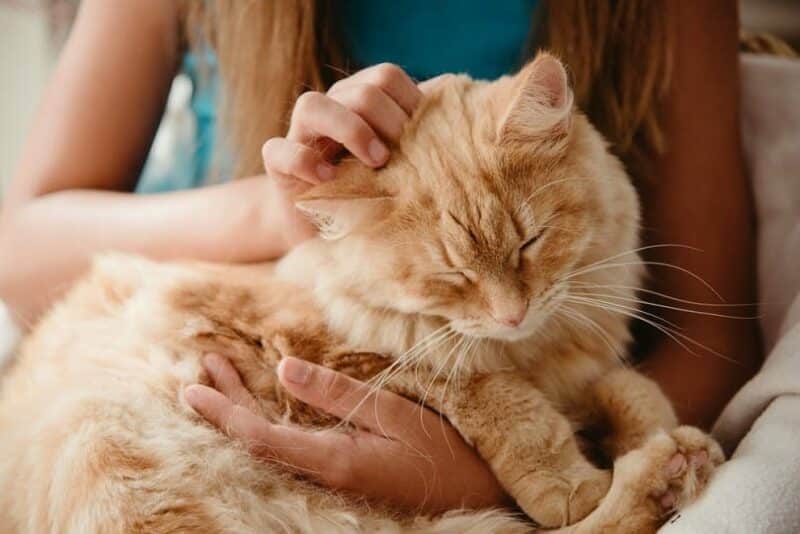Rescue cats often make wonderful pets, but while many quickly adapt to their new environment, some may exhibit certain behavioral challenges. Understanding and addressing these common problems can help improve the bond between you and your new pet. Here, we explain what signs to look for and what you can do to help make your rescue cat more comfortable so you can both have a better experience.

What Is Rescue Cat Behavior?
Rescue cat behavior refers to the patterns and actions exhibited by cats that have been adopted or rescued from shelters, abandonment, or other situations where they were not receiving proper care. These cats often have poor backgrounds and experiences that can influence their behavior in various ways. Rescue cat behavior may include both positive and negative aspects, and understanding these can help you provide appropriate care and create a supportive environment.

What Are the Signs of a Behavior Problem in a Rescue Cat?
- Many rescue cats experience fear and anxiety, especially in the first few days or weeks of being in a new environment, which can result in hiding, avoidance, or skittish behavior.
- Some rescue cats may be initially shy or reserved, particularly if they have had limited socialization.
- Cats that have experienced trauma or stressful situations may display aggression as a defense mechanism when people or other pets get too close.
- Some rescue cats may engage in destructive behaviors like scratching furniture or chewing on items, which can be a response to stress or boredom.
- Cats are territorial animals and may have difficulty getting used to sharing the house with other pets.
What Are the Causes of Rescue Cat Behavior?
If a cat has many bad experiences in the shelter or before they arrived there, they will be more likely to have behavioral problems. Abuse, neglect, poor socialization, frequently moving from one environment to another, and a general lack of positive experiences can all lead to behavioral issues with your new pet. Additionally, the crowded environment that many cats face in shelters, a lack of veterinary care, and even genetics can contribute to how cats respond to unfamiliar environments.
The 11 Ways to Care for a Rescue Cat With Behavioral Problems
1. Veterinary Check-Up
Schedule a thorough veterinary examination to rule out any underlying health issues that may be contributing to the behavior problems. Pain or discomfort can influence a cat’s actions.

2. Safe and Comfortable Environment
Provide a quiet and secure space where your cat can retreat and feel safe. Ensure that they have access to hiding spots, comfortable bedding, food, and litter boxes placed in low-traffic areas.
3. Slow and Gentle Introductions
If you have other pets, introduce them to your cat gradually. Use positive reinforcement, and monitor their interactions to prevent stress and conflicts.
4. Positive Reinforcement
Reinforce positive behaviors with treats, praise, and affection to help encourage your cat to repeat them.

5. Mental Stimulation
Stimulate your cat mentally and physically with interactive toys, scratching posts, and puzzle feeders to help reduce boredom and redirect destructive behaviors.
6. Regular Playtime
Engage in regular play sessions to provide an outlet for your cat’s energy and strengthen the bond between you. Use toys that mimic prey behavior to satisfy their hunting instincts.
7. Litter Box Management
Keep the litter box clean and place it in a quiet, easily accessible location. If your cat has litter box issues, consider trying different types of litter and addressing any environmental factors that may be contributing to the problem.

8. Routines
Establish a consistent routine for feeding, playtime, and interactions. Cats often thrive on predictability, and a stable routine can help reduce stress.
9. Pheromone Products
Feliway and other pheromone products can help create a calming environment for your cat. These products mimic the natural pheromones that cats use to mark their territory, and many cat owners report having success using them.
10. Patience and Understanding
Behavioral changes take time. Be patient with your cat, and avoid punishment, as it can increase fear and stress. Instead, focus on positive reinforcement and building trust.
11. Professional Help
If the behavior problems persist or escalate, consider seeking advice from a veterinarian or a certified animal behaviorist. They can provide personalized guidance and strategies to address specific issues.
If you need to speak with a vet but can't get to one, head over to PangoVet. It's an online service where you can talk to a vet online and get the advice you need for your pet — all at an affordable price!


Frequently Asked Questions
What Are Signs of Stress in a Rescue Cat?
Signs of stress may include hiding, excessive grooming, changes in appetite, aggression, or litter box issues. Monitoring behavior and addressing stressors can help alleviate these signs.
Can I Socialize an Adult Rescue Cat, or Is It Too Late?
While it may take more time, you can often socialize adult cats. Patience, positive reinforcement, and gradual exposure to new experiences can help them become more comfortable with social interactions. They often do best in quiet environments, where routines are easily established and household activity levels are more minimal.
How Can I Encourage My Rescue Cat to Play?
Experiment with different types of toys, including interactive toys, feathers, and laser pointers. Allow your cat to initiate play, and use positive reinforcement with treats or affection to make playtime enjoyable.

Conclusion
Common issues with rescue cats include shyness, fear, and anxiety. These cats can hide, act aggressively, or even get destructive. Some owners also notice that they can get quite vocal. Scheduling a check-up at the vet is a good idea because it can rule out potential health problems. Then, having a comfortable environment, clean litter boxes, and predictability through routine can help them start to feel comfortable.
Gradually introduce your rescue cat to other pets, engage them in playtime with interactive toys, and use pheromone products to help them feel even more comfortable, so they can start to form stronger bonds with you and the other pets. If problems continue to escalate, contacting a vet or behavioral therapist can help.
See also:
- Are Laparoscopic Spays Preferable to Traditional Ones?
- Eating Disorders in Cats: Signs, Causes & Treatment (Vet Answer)
Featured Image Creidt: Mimzy, Pixabay



















8 Responses
Hi, about a month ago we adopted a kitten from our area shelter. They told us he had been found on the street so we figure he had been there for a while. He was about 6 weeks old then. Now that he is with us, he seems fine during most of the day but each morning, he will race through the house, tearing into things and leeping over furniture and tables. He is very destructive of the curtains in the house and still hasn't taken to our adult cat who is 8 years old. Will this behavior ever stop or will it remain when he is much older? We had a cat with similar tactics years ago, he would actually jump on someones head if he was left around someone visiting us. Please help, we can't separate him, he destroys any room I have tried to have him remain in. We do have play time but mornings are always the same for him. He was seen by our vet, seems healthy he reports.
Hi Katherine Burgei. What a fun, though tiring, time when a new kitten joins the family! It sounds like your little guy has a big burst of morning energy.
Since your veterinarian confirmed your kitten is healthy, these "zoomies" are likely normal kitten behavior. They're just high-energy periods!
For more details on these topics, we have a couple of posts that might help:
https://www.catster.com/lifestyle/when-do-kittens-calm-down-mature/
https://www.catster.com/ask-the-vet/cat-zoomies/
Since you're worried about the destructive behavior continuing, for a custom behavior plan, we recommend consulting a behavior professional or your veterinarian. If you have any new or escalating health or behavior concerns, please do not hesitate to book an appointment with a professional at PangoVet.com. They are best equipped to assess the situation fully
Adopted a one year-old cat and she’s sweet, but she doesn’t want me to be around her. The only time I can be around her in the evening where she goes by the toilet and I can pet her and she rolls around and accept it but I only get to see her like for five minutes of the whole day she hides under the couch. She’ll sit on a chair if I pet her she takes off. I go into the kitchen and if she’s there she runs I don’t know what to do. I’ve had her a month
Some people tell me to ignore her other people tell me to give her love. I want her to come to me. I don’t know what to do.
Hi Me, thanks for giving this cat a chance. With rescues it can be challenging, their past and trauma might lead to many behavioral issues. You might find some useful tips here:
How to Get a Stray Cat to Trust You: 6 Vet-Approved Tips & Tricks – https://www.catster.com/cat-behavior/how-to-get-stray-cat-to-trust-you/
If you need further assistance with this or any other concern you might have, please know that you can book a one-on-one call with a vet who can help by providing personalized tips and advice to help manage your cat’s behavior at www.pangovet.com.
Hi…I have a rescue male cat..I be had him about 7 months now..he’s adapted well but often goes days without pooping..(3-4)…is this normal?..thanks..Blake
Hi Blake, no, that is not normal. This is considered constipation. You can learn more about this in the following post: Constipation in Cats: Our Vet Explains the Signs, Causes & Treatment- https://www.catster.com/ask-the-vet/constipation-in-cats-vet-answer/
If you need to go through the specifics of your cat’s case, please don’t hesitate to contact: www.pangovet.com they can help you narrow down the possible causes and provide you with some prevention tips to try.
I received a rescue cat 7 weeks ago, this was from the RSPCA who said she was an alternative cat. Star was terrified and hid for two weeks, she cried and howled it wasalful. Week 7 she allows my hand near her to sniff but wont be touched. I am introducing her to my dogs and other rescue cat, the other cat seems relaxed now with her presence. Star lives in our cateo with a cat flap and she goes in and out and spends time in my neighbours garden. Any tips to get her to trust me? I have bought her toys and igloos lots of soft blankets and dark crate, althou she doesnt seem to hide now. Thank you for any help. Liz
Hi Liz,
Thank you for sharing Star’s story with us. It sounds like you’ve been incredibly patient and caring in helping her adjust. Building trust with a rescue cat can be a gradual process, and it’s great to hear she’s making progress.
For additional tips on gaining her trust, you might find our article, How to Get a Stray Cat to Trust You, very helpful. It offers practical advice and strategies that could further support your efforts.
Please copy and paste the link on your preferred browser:
– https://www.catster.com/cat-behavior/how-to-get-stray-cat-to-trust-you/
If you have any more questions or need further assistance, please don’t hesitate to reach out. We’re here to help!
Best regards